Picture
Your Present Location: HOME> PictureRUC think tank delegation visits South Europe for presentation and investigation
On December 10-12, under the leadership of Professor Wu Xiaoqiu, Vice President of Renmin University of China (RUC) and Director of the Sino-US People-to-People Exchange Research Center, RUC’s think tank delegation conducted research in Greece and Italy against the backdrop of Sino-US trade friction. Members of the delegation included Wang Wen, Executive Dean of Chongyang Institute for Financial Studies at Renmin University of China (RDCY), Executive Director of the Sino-US People-to-People Exchange Research Center, Li Fengyun, Associate Professor of the School of Finance at RUC, Chen Chenchen, Research Fellow of RDCY, and Wu Yinxuan, Assistant Researcher of RDCY.
On December 10, the delegation visited the University of Athens, having a dialogue on China-Greece cultural exchange and educational cooperation. The President Meletios-Athanasios Dimopoulos, Vice Presidents Nikolaos Milonas and Konstantinos Buraselis, and Fotini Fryda, the Director of the Faculty of Europe and International Relations of University of Athens attended the meeting. Both sides negotiated the details of promoting the research and academic exchange and cooperation.
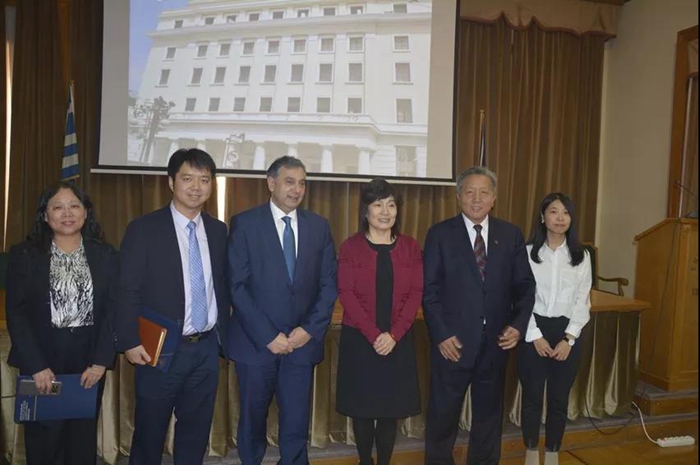
The delegation was invited to visit Port of Piraeus for investigations and had an in-depth exchange with several staff of China Ocean Shipping Company on the process of Port of Piraeus Project and the prospects of China-Europe economic and trade relations under the frame of the Belt and Road Initiative (BRI). The delegation also visited Aikaterini Laskaridis Foundation, conducting the research on the status quo of cultural exchanges between China and Greece.
During the visit, a seminar themed the 5th anniversary of the BRI: reviewing the Challenges of the Past and Prospects for the Future was co-organized by the Chamber of Commerce and Industry of Piraeus (PCCI), the Chinese Embassy in Greece and Renmin University of China, attended by nearly 100 Greeks from all walks of life. Vasilis Korkidis, Chairman of the Piraeus Chamber of Commerce and Industry, delivered a warm speech. Zhang Qiyue, Chinese ambassador to Greece, said that the Port of Piraeus project is a successful example of the early achievements of the Sino-Greek cooperation under the BRI. It is the leading and flagship project of China-Greece pragmatic cooperation and also a big project supporting the Greek economic recovery. Professor Wu Xiaoqiu pointed out that China is currently summarizing the experience of 40 years of reform and opening up, aiming to explore how to follow the market-oriented and open road. At present, it’s the best period of Sino-Greek relations, and the two countries will have more opportunities for mutual learning and mutual cooperation in the future, and continue to make outstanding contributions to the development of human civilization. Dean Wang Wen made a straightforward refutation on the labels of China's foreign economic behavior in western media, and communicated with the Greek business elite frankly.
On the evening of December 10, a dialogue on “5th Anniversary of the BRI: Reviewing the Challenges of the Past and Prospects for the Future” was held at the Greek International Chamber of Commerce (ICC), attended by many leaders from the political, business and academic fields, such as Nicolas Vernicos, the President of the ICC and Chairman of the Silk Road International Chamber of Commerce, Alexandros Modiano, the Deputy Mayor of Athens, Fotis Provatas, the former Deputy Mayor of Athens. Professor Wu Xiaoqiu noted that China's current foreign economic exchanges have a long-term sight and aim to promote small and medium-sized countries and large countries to share the same benefits of global economic development and promote the free flow of global capital and goods in the current pattern of global interest distribution. The delegation also had an in-depth exchange with Greek representatives on China's economic development and China's role and objectives in promoting the improvement of the world economic order.
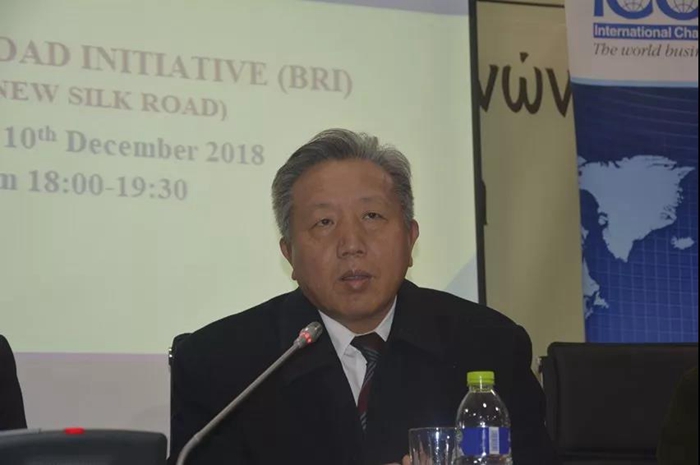
On December 11, the delegation went to Milan to hold a meeting with ISPI, a well-known think tank in Italy, on China's economic development under the background of Sino-US trade friction and the fifth anniversary of the BRI. The meeting was presided over by ISPI Vice President Carlo Secchi. Vice President Wu Xiaoqiu and Dean Wang Wen delivered keynote speeches respectively. This meeting was attended by more than 50 well-known Italian celebrities from political, business, and academic circles. The two sides frankly exchanged views on current Sino-US relations and hot issues in China-EU relations. Professor Wu Xiaoqiu believes that the Sino-US trade friction can be resolved through negotiations and China’s harder task is domestic reform. Thus China has generally maintained a sober attitude. In addition, a strong EU and a stable euro zone are conducive to balance the global economic order, and China attaches great importance to friendly cooperation with Europe.
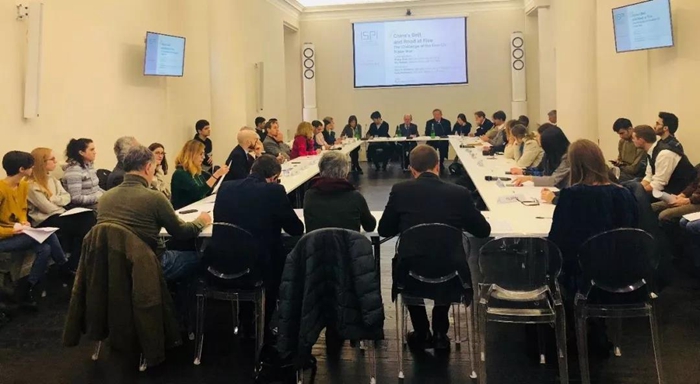
On December 12, the delegation visited the University of Bologna and the Confucius Institute to have a dialogue on Sino-Italian cultural exchanges. Mirko Degli Esposti, Executive Vice President of the University of Bologna, Antonino Rotolo, Vice President, Marina Timoteo, Foreign Dean of the Confucius Institute at Bologna University, and Xu Ying, Chinese Dean of the Confucius Institute, attended the dialogue, during which both sides exchanged views on the details of scientific research and academic exchanges.
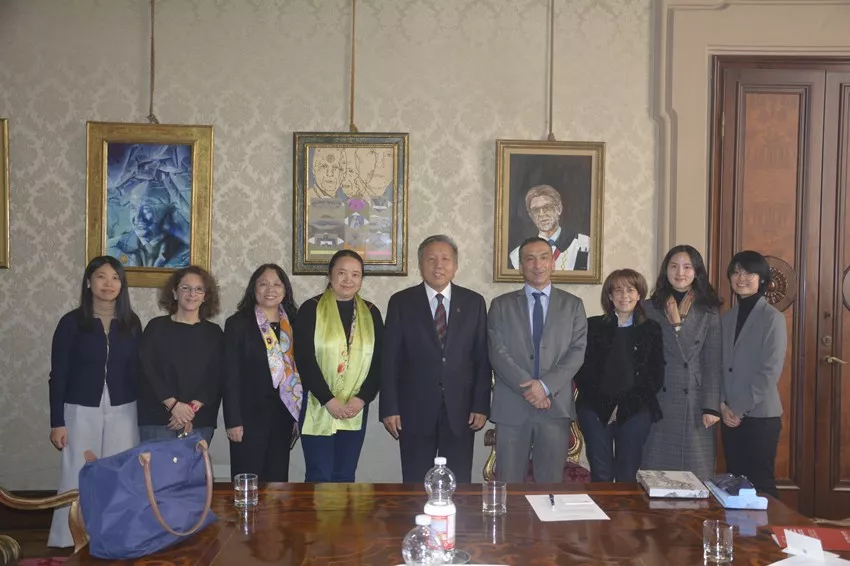
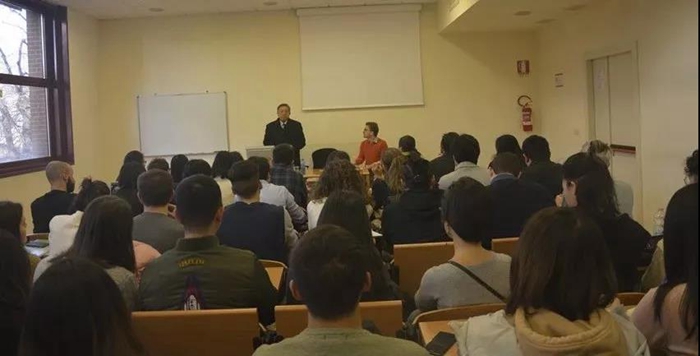
During the exchange at the University of Bologna, Vice President Wu Xiaoqiu gave a keynote lecture entitled China’s economic development and Sino-European relations in the background of Sino-US trade friction, and communicated with the professors and students on the direction of current China’s economic development, China-Europe industrial policy and cultural cooperation. Professor Wu stressed that since the end of the 20th century, tremendous changes have been arisen in the global economic landscape. China, the EU, and the United States have become the three worldwide major economies. China and Europe should strengthen cooperation and jointly ameliorate the international economic order in the future.























































































 京公网安备 11010802037854号
京公网安备 11010802037854号





